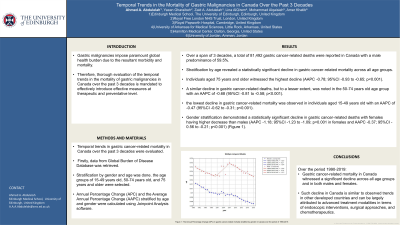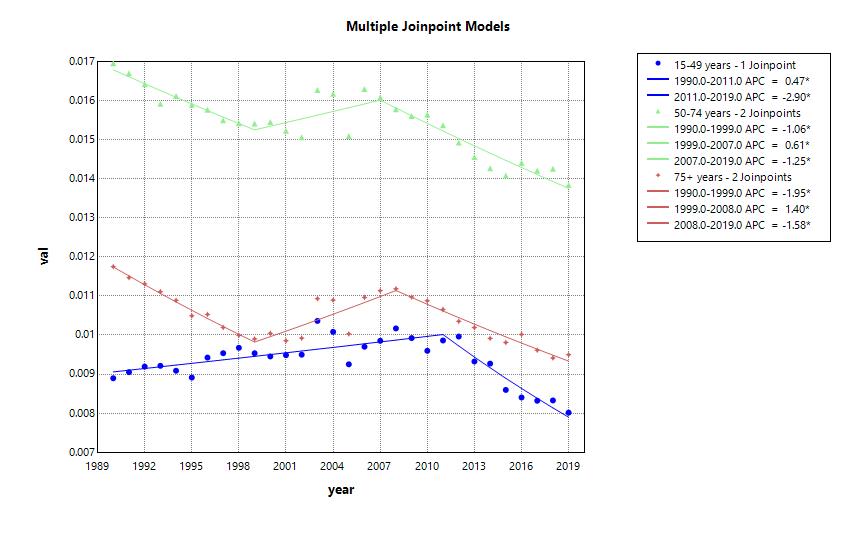Monday Poster Session
Category: Stomach
P3319 - Temporal Trends in the Mortality of Gastric Malignancies in Canada Over the Past 3 Decades
Monday, October 28, 2024
10:30 AM - 4:00 PM ET
Location: Exhibit Hall E

Has Audio

Ahmed A. A. Abdulelah, MD
University of Edinburgh
Edinburgh, Scotland, United Kingdom
Presenting Author(s)
Ahmed A. Abdulelah, MD1, Yazan Gharaibeh, MD2, Zaid A. Abdulelah, MD3, Lina AlQirem, MD4, Mohammad Alqaisieh, MD5, Amer Khatib, MD6
1University of Edinburgh, Edinburgh, Scotland, United Kingdom; 2Royal Free London NHS Trust, London, England, United Kingdom; 3Royal Papworth Hospital, Cambridge, England, United Kingdom; 4University of Arkansas for Medical Sciences, Little Rock, AR; 5Hamilton Medical Center, Dalton, GA; 6University of Jordan, Amman, 'Amman, Jordan
Introduction: Gastric malignancies impose paramount global health burden due to the resultant morbidity and mortality. Therefore, thorough evaluation of the temporal trends in the mortality of gastric malignancies in Canada over the past 3 decades is mandated to effectively introduce effective measures at therapeutic and preventative level.
Methods: The temporal trends in gastric cancer-related mortality in Canada over the past 30 years was initially evaluated by accessing data from the Global Burden of Disease 2019 database. Subsequently, Joinpoint Analysis software (v 5.2.0, National Cancer Institute) was utilized to calculate the Annual Percentage Change (APC) and the Average Annual Percentage Change (AAPC), stratified by gender and age.
Results: Over a span of 3 decades, a total of 81,492 gastric cancer-related deaths were reported in Canada with a male predominance of 59.5%. Stratification by age revealed a statistically significant decline in gastric cancer-related mortality across all age groups, with individuals aged 75 years and older witnessing the highest decline (AAPC -0.78; 95%CI -0.93 to -0.65; p< 0.001). A similar decline in gastric cancer-related deaths, but to a lesser extent, was noted in the 50-74 years old age group with an AAPC of -0.68 (95%CI -0.81 to -0.58; p< 0.001). Whereas the lowest decline in gastric cancer-related mortality was observed in individuals aged 15-49 years old with an AAPC of -0.47 (95%CI -0.62 to -0.31; p< 0.001) (Figure 1). Gender stratification demonstrated a statistically significant decline in gastric cancer-related deaths with females having higher decrease than males (AAPC -1.18; 95%CI -1.23 to -1.09; p< 0.001 in females and AAPC -0.37; 95%CI -0.56 to -0.21; p< 0.001).
Discussion: Over the period 1990-2019, gastric cancer-related mortality in Canada witnessed a significant decline across all age groups and in both males and females. Such decline in Canada is similar to observed trends in other developed countries and can be largely attributed to advanced treatment modalities in terms of endoscopic interventions, surgical approaches, and chemotherapeutics.

Disclosures:
Ahmed A. Abdulelah, MD1, Yazan Gharaibeh, MD2, Zaid A. Abdulelah, MD3, Lina AlQirem, MD4, Mohammad Alqaisieh, MD5, Amer Khatib, MD6. P3319 - Temporal Trends in the Mortality of Gastric Malignancies in Canada Over the Past 3 Decades, ACG 2024 Annual Scientific Meeting Abstracts. Philadelphia, PA: American College of Gastroenterology.
1University of Edinburgh, Edinburgh, Scotland, United Kingdom; 2Royal Free London NHS Trust, London, England, United Kingdom; 3Royal Papworth Hospital, Cambridge, England, United Kingdom; 4University of Arkansas for Medical Sciences, Little Rock, AR; 5Hamilton Medical Center, Dalton, GA; 6University of Jordan, Amman, 'Amman, Jordan
Introduction: Gastric malignancies impose paramount global health burden due to the resultant morbidity and mortality. Therefore, thorough evaluation of the temporal trends in the mortality of gastric malignancies in Canada over the past 3 decades is mandated to effectively introduce effective measures at therapeutic and preventative level.
Methods: The temporal trends in gastric cancer-related mortality in Canada over the past 30 years was initially evaluated by accessing data from the Global Burden of Disease 2019 database. Subsequently, Joinpoint Analysis software (v 5.2.0, National Cancer Institute) was utilized to calculate the Annual Percentage Change (APC) and the Average Annual Percentage Change (AAPC), stratified by gender and age.
Results: Over a span of 3 decades, a total of 81,492 gastric cancer-related deaths were reported in Canada with a male predominance of 59.5%. Stratification by age revealed a statistically significant decline in gastric cancer-related mortality across all age groups, with individuals aged 75 years and older witnessing the highest decline (AAPC -0.78; 95%CI -0.93 to -0.65; p< 0.001). A similar decline in gastric cancer-related deaths, but to a lesser extent, was noted in the 50-74 years old age group with an AAPC of -0.68 (95%CI -0.81 to -0.58; p< 0.001). Whereas the lowest decline in gastric cancer-related mortality was observed in individuals aged 15-49 years old with an AAPC of -0.47 (95%CI -0.62 to -0.31; p< 0.001) (Figure 1). Gender stratification demonstrated a statistically significant decline in gastric cancer-related deaths with females having higher decrease than males (AAPC -1.18; 95%CI -1.23 to -1.09; p< 0.001 in females and AAPC -0.37; 95%CI -0.56 to -0.21; p< 0.001).
Discussion: Over the period 1990-2019, gastric cancer-related mortality in Canada witnessed a significant decline across all age groups and in both males and females. Such decline in Canada is similar to observed trends in other developed countries and can be largely attributed to advanced treatment modalities in terms of endoscopic interventions, surgical approaches, and chemotherapeutics.

Figure: Figure 1: The Annual Percentage Change (APC) of gastric cancer-related deaths stratified by age in Canada during the period 1990-2019.
Disclosures:
Ahmed Abdulelah indicated no relevant financial relationships.
Yazan Gharaibeh indicated no relevant financial relationships.
Zaid Abdulelah indicated no relevant financial relationships.
Lina AlQirem indicated no relevant financial relationships.
Mohammad Alqaisieh indicated no relevant financial relationships.
Amer Khatib indicated no relevant financial relationships.
Ahmed A. Abdulelah, MD1, Yazan Gharaibeh, MD2, Zaid A. Abdulelah, MD3, Lina AlQirem, MD4, Mohammad Alqaisieh, MD5, Amer Khatib, MD6. P3319 - Temporal Trends in the Mortality of Gastric Malignancies in Canada Over the Past 3 Decades, ACG 2024 Annual Scientific Meeting Abstracts. Philadelphia, PA: American College of Gastroenterology.
